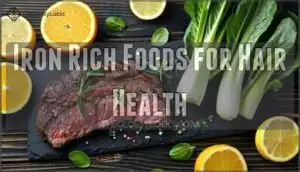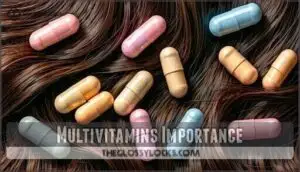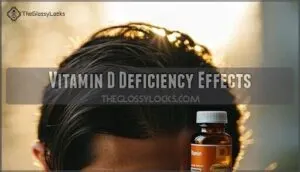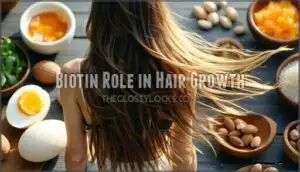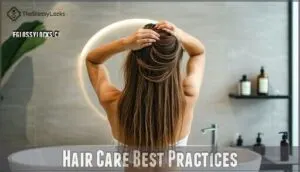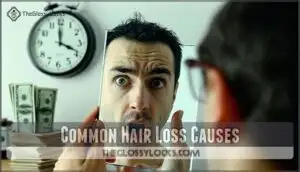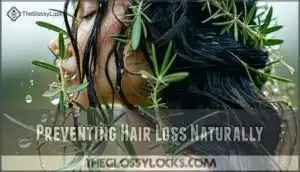This site is supported by our readers. We may earn a commission, at no cost to you, if you purchase through links.
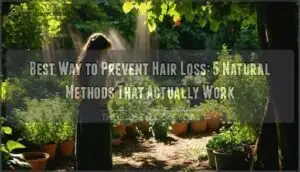
You’ll want to focus on eating protein-rich foods, taking vitamin D and biotin supplements, and treating your scalp like the delicate ecosystem it is.
Gentle hair care matters too – skip the tight ponytails and excessive heat styling that stress your follicles.
Think of your hair like a garden that needs proper nutrition from within.
Managing stress levels and staying hydrated also play bigger roles than most people realize.
The most effective strategies combine simple dietary changes with smart hair care habits.
Table Of Contents
- Key Takeaways
- Dietary Adjustments Matter
- Supplements for Hair Health
- Hair Care Best Practices
- Common Hair Loss Causes
- Preventing Hair Loss Naturally
- Frequently Asked Questions (FAQs)
- How to prevent hair loss?
- How do you get rid of hair loss at home?
- How can I Stop my Hair from falling out?
- Can you stop hair loss?
- How can a healthy diet help prevent hair loss?
- How do I protect my hair from thinning hair?
- Is hair loss permanent?
- Do hot showers cause hair loss?
- Does caffeine stop hair loss?
- Can stress cause hair loss?
- Conclusion
Key Takeaways
- Fuel your hair from within – You’ll need to eat protein-rich foods, like eggs, chicken, and beans, while taking biotin and vitamin D supplements to give your follicles the nutrients they need to produce strong, healthy strands.
- Treat your scalp gently – You should wash with a mild shampoo every other day, avoid tight hairstyles that pull at the roots, and skip excessive heat styling that weakens your hair’s protein bonds.
- Stay hydrated and manage stress – You cannot ignore how dehydration and chronic stress disrupt your hair’s growth cycle, so drink eight glasses of water daily and find ways to reduce stress levels.
- Try natural remedies consistently – You will see better results when you massage coconut oil or essential oils, like rosemary, into your scalp regularly, as these natural treatments improve circulation and follicle health without harsh chemicals.
Dietary Adjustments Matter
You’ve probably heard "you are what you eat," and your hair follicles couldn’t agree more.
What you put on your plate directly affects your hair’s strength, growth, and thickness, making dietary choices one of the most powerful tools in preventing hair loss.
Mediterranean Diet Benefits
The Mediterranean diet works like a nutritional powerhouse for hair loss prevention.
When you eat raw vegetables and fresh herbs three times weekly, you’re boosting scalp circulation and reducing diet inflammation.
This nutrient variety provides essential protein sources that enhance hair luster naturally.
The Mediterranean diet’s anti-inflammatory foods create ideal conditions for healthy follicles and stronger strands, promoting a healthy environment for hair growth.
Protein Rich Foods Importance
Your hair follicles need protein to thrive, requiring 40-60 grams daily for ideal growth.
Eggs provide biotin for stronger strands, while chicken delivers arachidonic acid that stimulates thickness.
Vegan protein sources like beans and lentils work just as well.
Without adequate protein intake, nutritional deficiencies develop, weakening your hair’s foundation and accelerating loss.
Vitamin a Role in Hair Growth
Beyond adequate protein intake, vitamin A plays a surprising role in your hair’s health journey.
This powerhouse nutrient supports cellular differentiation in hair follicles and maintains healthy scalp health.
You’ll find retinol benefits in sweet potatoes, spinach, and carrots.
However, beware of toxicity risks from excessive supplementation, as nutritional deficiencies often manifest as brittle strands, making balanced vitamin A intake essential for effective hair loss prevention.
Iron Rich Foods for Hair Health
Iron deficiency often triggers hair loss through low ferritin levels, but you can fight back with smart food choices.
Lean beef provides heme iron that your body absorbs more easily than plant sources.
Bok choy boosts ferritin levels naturally, while pairing iron-rich foods with vitamin C enhances iron absorption.
Don’t let anemia impact your hair’s future.
Supplements for Hair Health
While you can’t fix hair loss overnight, the right supplements can make a real difference in your hair’s health and growth cycle.
Strategic supplementation targets specific nutrient deficiencies that often contribute to thinning hair, giving your follicles the building blocks they need to produce stronger, healthier strands.
Multivitamins Importance
Quality multivitamins pack essential nutrients your hair needs to thrive.
When you’re dealing with hair loss, vitamin deficiencies often play a bigger role than you’d expect. A good hair vitamins formula addresses multiple gaps at once.
Here’s what to prioritize in your multivitamin selection:
- Vitamin Absorption – Choose chelated minerals for better uptake
- Supplement Quality – Pick reputable brands with third-party testing
- Dosage Considerations – Follow recommended amounts to avoid toxicity
- Deficiency Identification – Get blood work to target specific needs
Vitamin D Deficiency Effects
Low vitamin D levels can trigger hair loss conditions like alopecia, affecting millions worldwide.
You’ll want vitamin D testing if you’re experiencing unexplained hair thinning. Sunlight exposure helps, but supplementation strategies often work better for deficiencies.
Most adults need 1,000-4,000 IU daily, though dosage recommendations vary. Hair loss and nutrition deficiencies go hand-in-hand, making vitamin D essential for healthy follicles.
Biotin Role in Hair Growth
Your body needs biotin to produce the proteins that form your hair strands.
Biotin deficiency can trigger hair loss, but most people get enough from eggs, nuts, and fish.
Before taking biotin supplements, check your biotin absorption through blood tests. Standard biotin dosage ranges from 2.5-10mg daily.
Biotin products are available for those with deficiencies. Biotin side-effects are rare when following recommended amounts for ideal hair health.
Saw Palmetto Benefits
Saw palmetto works differently from biotin by targeting DHT reduction, the hormone behind male pattern baldness.
This natural DHT blocker shows promise for alopecia treatment when you take 100-320mg daily.
Research suggests it improves hair density and count, especially for androgenetic hair loss. Follow dosage guidelines carefully and check for supplement interactions with medications you’re already taking.
Hair Care Best Practices
Your daily hair care routine can make or break your hair loss prevention efforts, and simple changes often produce the most dramatic results.
The way you wash, style, and treat your hair directly impacts follicle health and determines whether you’ll keep those strands or watch them disappear down the drain.
Regular Washing Importance
Your shampoo frequency directly impacts scalp health and hair loss prevention.
Washing every other day removes product buildup without stripping natural oils. Use lukewarm water temperature – hot water damages follicles and increases shedding.
Focus your washing technique on the scalp, not hair lengths. Clean scalp equals healthy hair growth.
These simple hair care tips make a real difference.
Gentle Styling Techniques
Your hair deserves gentler treatment than you might think.
Wide-Toothed Combs prevent hair breakage better than fine-tooth brushes. Choose Loose Hairstyles over tight ponytails that pull at roots.
Silk Scarves protect strands while you sleep. Try Scalp Massage with Hair-Friendly Products to boost circulation.
These simple hair care tips reduce hair damage without sacrificing style, using methods like Wide-Toothed Combs.
Avoiding Heat Styling Tools
Beyond gentle handling techniques, your styling tools can make or break your hair health.
Heat styling creates significant hair damage through excessive temperatures that weaken protein bonds.
Consider these heat damage prevention strategies:
- Switch to air drying – Skip the blow dryer and embrace your natural texture
- Use low heat settings when styling tools are necessary
- Apply product protection with heat protectant serums before any heat exposure
- Explore alternative styling methods like braiding or twist-outs
- Limit frequency of heat styling to twice weekly maximum
For enhanced results, consider using specialized air-dry products.
Natural Remedies Like Coconut Oil
While avoiding harsh chemicals protects your hair, coconut oil offers powerful natural remedies for hair loss prevention.
Rich in lauric acid and vitamin E, coconut oil strengthens follicles and reduces breakage.
Warm the oil, massage into your scalp using circular motions, then leave for 30 minutes, which delivers nutrients directly to roots, promoting healthier growth naturally.
Common Hair Loss Causes
You can’t prevent hair loss if you don’t understand what’s causing it in the first place.
Understanding whether your hair loss stems from genetics, stress, medical conditions, or common myths like wearing hats too often helps you choose the right prevention strategy.
This approach allows you to address the root cause of your hair loss, enabling a more effective prevention plan.
Uncontrollable Risk Factors
While proper hair care helps, some factors remain beyond your control.
Understanding these limitations can help set realistic expectations for your hair loss prevention efforts.
Several uncontrollable elements contribute to hair loss:
- Genetic predisposition – Family history determines your susceptibility
- Autoimmune diseases – Conditions like alopecia areata target hair follicles
- Hormonal imbalances – Natural fluctuations affect growth cycles
- Aging process – Hair naturally thins over time
- Scalp conditions – Medical issues impact follicle health
Wearing Hats Myth
Think hats cause hair loss? You’re not alone in believing this common myth.
No scientific evidence supports hat hair loss claims. One study actually found daily hat use decreased hair loss in identical twins.
However, tight hats impact scalp circulation, while breathable materials don’t suffocate follicles.
| Hat Factor | Hair Loss Impact |
|---|---|
| Loose, breathable hats | No negative effects |
| Tight hats daily | May reduce circulation |
| Hat hygiene effects | Clean hats prevent buildup |
Washing Too Much Impact
You might think washing your hair daily causes hair loss, but that’s not true.
Regular washing with mild shampoo actually keeps your scalp healthy by removing product buildup and excess scalp oil.
What damages hair isn’t shampoo frequency—it’s harsh scrubbing, hot water, and rough drying methods.
Gentle washing prevents scalp inflammation that disrupts healthy hair growth cycles.
Stress and Medical Conditions
Medical conditions like hormonal imbalance, autoimmune diseases, and scalp infections can trigger significant hair loss.
Stress management becomes critical since chronic stress disrupts your hair’s natural growth cycle. When you’re constantly stressed, your body redirects energy away from hair follicles.
Thyroid disorders, PCOS, and alopecia areata are common culprits that require proper medical treatments to address underlying causes effectively.
Preventing Hair Loss Naturally
You don’t need expensive treatments or complicated routines to keep your hair healthy and strong.
Simple lifestyle changes like staying hydrated, quitting smoking, and using natural remedies can substantially reduce hair loss while supporting your body’s natural growth processes.
Staying Hydrated Importance
Water serves as your hair’s lifeline, delivering essential nutrients directly to follicles while maintaining ideal scalp moisture balance.
Dehydration’s impact on hair growth can’t be ignored—it disrupts the delicate ecosystem your strands need to thrive.
- Brittle, breaking hair that snaps at the slightest touch
- Dry, flaky scalp that itches constantly throughout the day
- Thinning hair that falls out in alarming clumps
- Dull, lifeless strands that refuse to shine
Aim for eight glasses daily for effective hair loss prevention to keep your hair healthy and strong.
Quitting Smoking Benefits
Smoking creates a perfect storm for hair loss by restricting blood flow to your scalp and triggering chronic inflammation throughout your body.
When you quit, you’ll experience improved circulation and reduced inflammation, leading to better nutrient absorption and hormonal balance.
Your scalp health dramatically improves, giving your hair follicles the oxygen-rich environment they need to thrive.
Essential Oils Role
Essential oils offer promising hair loss prevention benefits through targeted scalp health improvement.
Lavender, cedarwood, thyme, and rosemary oils showed significant alopecia improvement in studies when combined together.
These natural hair loss treatments work by reducing inflammation, balancing oil production, and stimulating follicles.
Regular oil application of these essential oils provides effective hair loss remedies without harsh chemicals.
You can find many options for essential oils online.
Onion Juice Remedies
Research shows onion juice’s sulfur benefits may help with alopecia areata, though results vary between individuals.
One study found 87% of patients experienced regrowth with twice-daily application frequency.
While the smell can be off-putting, DIY recipes combining onion juice with essential oils help with smell mitigation.
This natural hair loss treatment isn’t a miracle cure, but it’s worth trying alongside other hair loss remedies.
Frequently Asked Questions (FAQs)
How to prevent hair loss?
Thinning crowns aren’t inevitable—you can fight back. Eat protein-rich foods, take biotin supplements, wash gently with mild shampoo, avoid tight hairstyles, skip harsh chemicals, and manage stress effectively.
How do you get rid of hair loss at home?
You can massage coconut oil into your scalp.
Apply onion juice twice daily.
Use gentle shampoos, avoid tight hairstyles.
Try essential oils like rosemary or peppermint to stimulate growth naturally.
How can I Stop my Hair from falling out?
You can reduce hair loss by eating protein-rich foods, taking biotin supplements, and using gentle shampoos.
Avoiding tight hairstyles and managing stress levels are also crucial for reducing hair loss.
Staying hydrated and protecting your hair from heat damage and harsh chemicals are additional measures to consider.
Can you stop hair loss?
Like a garden that needs tending, your hair’s fate isn’t sealed.
You can’t completely stop genetic hair loss, but you can slow it substantially.
Early intervention with proper nutrition, gentle care, and medical treatments works best.
How can a healthy diet help prevent hair loss?
You’ll want to eat plenty of protein, iron, and vitamins to keep your hair strong.
Mediterranean diets with leafy greens, salmon, eggs, and nuts work best.
Stay hydrated and avoid crash diets.
How do I protect my hair from thinning hair?
Think of your hair like a delicate garden that needs gentle care.
You’ll protect it by using mild shampoos, avoiding tight hairstyles, skipping harsh heat tools, and eating protein-rich foods with vitamins A, C, and D.
Is hair loss permanent?
Hair loss isn’t always permanent. Pattern baldness typically progresses, but conditions like stress-related shedding, nutritional deficiencies, or hormonal changes can often be reversed with proper treatment and lifestyle adjustments.
Do hot showers cause hair loss?
Before telegraphs carried news, people worried about daily habits affecting their health.
Hot showers don’t directly cause hair loss, but excessive heat can weaken hair strands and irritate your scalp, making existing hair more fragile and prone to breakage due to excessive heat.
Does caffeine stop hair loss?
Caffeine can temporarily improve blood circulation to your scalp when applied topically through specialized shampoos or treatments.
However, there’s limited scientific evidence that caffeine substantially prevents or stops hair loss long-term, which is a crucial point to consider when evaluating its effectiveness for this purpose.
Can stress cause hair loss?
Yes, stress can definitely cause hair loss. When you’re stressed, your body disrupts the hair growth cycle, leading to increased shedding. Managing stress through relaxation techniques helps protect your hair.
Conclusion
Rome wasn’t built in a day, and neither is healthy hair growth.
The best way to prevent hair loss combines multiple approaches: nourishing your body with protein-rich foods and essential vitamins, treating your scalp gently, and managing stress levels.
You don’t need expensive treatments when simple dietary changes, proper hydration, and smart hair care habits work effectively.
Start with one or two methods, then gradually incorporate others.
Your hair follicles will thank you for the consistent, natural care, which is a result of simple dietary changes.
- https://www.ncbi.nlm.nih.gov/pmc/articles/PMC5596642/
- https://my.clevelandclinic.org/health/diseases/21753-hair-loss
- https://pubmed.ncbi.nlm.nih.gov/32516434/
- https://onlinelibrary.wiley.com/doi/abs/10.1046/j.1365-2230.2002.01076.x
- https://www.goodrx.com/well-being/alternative-treatments/natural-hair-growth-products-remedies?srsltid=AfmBOorRW0P_-BkhKJ0pMNShK5kYQFXou-IthXXlkw9h1RVrysW91hxf




